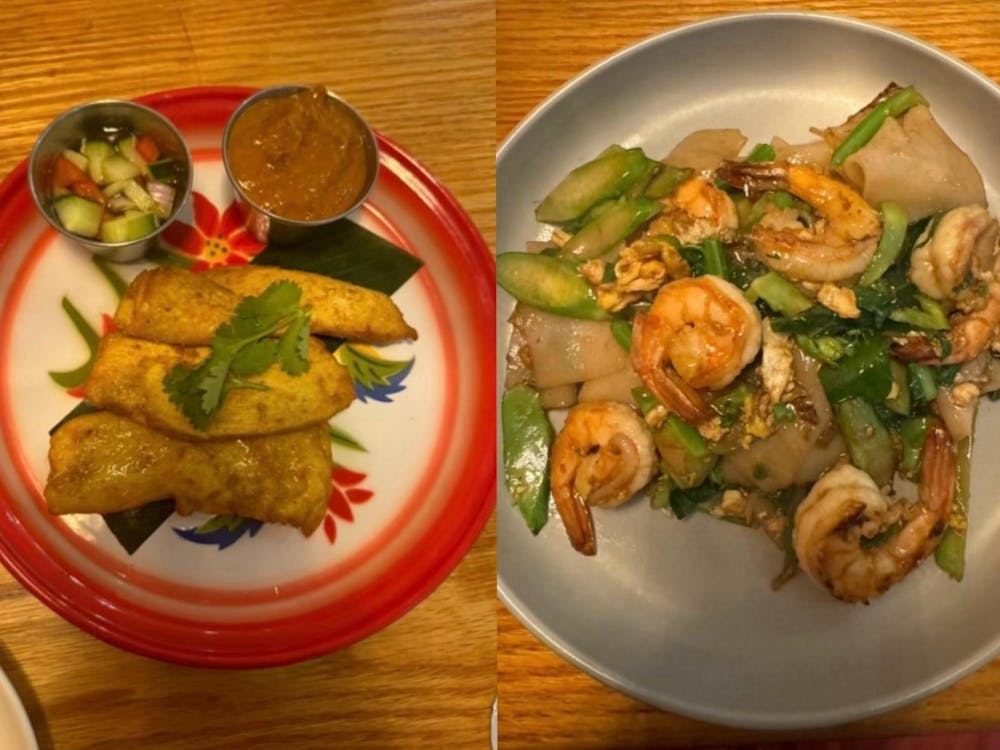As the cool nighttime breeze filters through your dorm room window, you can faintly hear it. One voice begins and slowly turns into a harmonic blend of a cappella pitches as more voices join in, filling the late summer air.
You immediately abandon your studies and rush outside with your friends to join the crowd outside your dorm. And then you all realize you have been bitten by the a cappella bug.
"Any time I heard a cappella was coming to the quad, I wanted to be there," said Lindsay Wilkinson, a fourth-year College student and a member of the Virginia Belles.
Whether their first a cappella experience was at one of many evening dorm sings or the annual Rotunda Sing, hundreds of students are struck each year by the University's a cappella craze.
But while some students are happy to remain loyal fans, others want to get on the inside of the a cappella scene.
"It was so surreal, so awesome," recalled Wilkinson of her first Rotunda Sing. "I was fascinated and wanted to be a part of it."
Each year, without fail, they come in hordes, and this year was no exception. Eagerly putting their vocal talents to the test, experienced musicians and novices alike braved the fierce competition for one of the coveted spots in the University's a cappella tradition.
So why all the hype? Why does a cappella attract so many people to audition each year?
Many current members of these groups trace their initial interest back to the Rotunda Sing, an event where each a cappella group performs on the north end of the Lawn.
"I thought, 'Wow that's so cool. They're having so much fun,'" said Janna Harris of listening to the a cappella groups at her first Rotunda Sing. Harris, a fourth-year College student, is now the president of the New Dominions, one of the University's coed groups.
Second-year College student Erick Hong was attracted to the performing style of the Hullabahoos after seeing the group perform at a Rotunda Sing.
"They threw a lot of their personality
into performing, something I wanted to do," said Hong, who is a new member to the male group, the Hullabahoos.
Other students came to the University with a specific interest in singing, already familiar with the school's a cappella phenomenon.
"I heard it was a big part of student life here," said first-year College student Jonathan Byrne, one of the newest members of ChooSE (Christian Hoos Exalt), the University's coed Christian group.
Even those with no previous musical inclinations find themselves drawn to try out for a cappella by the excitement and energy of the groups.
"I've heard a lot of people talk about how girls just swoon over them when they sing," said second-year Engineering student Adam Humphreys, the newest member of the Virginia Gentlemen. Humphreys added that girls are not the primary focus for the Virginia Gentlemen, but he said for many male a cappella groups, "it's in the back of their minds."
And of course the high reputation and longtime tradition of University a cappella also attracts potential singers.
"We have really good groups here that put in a lot of effort," said Joel Iverson, fourth-year College student and president of the Virginia Gentlemen, noting that other schools don't have the same level of a cappella following as the University.
The Virginia Gentlemen started the University's a cappella tradition in 1953, when it split off from the Glee Club. The years that followed brought an onslaught of new groups: the Virginia Belles, the Hullabahoos, the Virginia Sil'hooettes, the New Dominions, the Academical Village People, ChooSE, Hoos in Treble and the Blue Notes.
"The East Coast in general has a lot of a cappella groups," said Harris. "U.Va. is unique in the fact that all the a cappella groups we have are quite good."
But high quality means competitive auditions. With an average of 50 to 100 people trying out for only a few spaces in each group, nerves and emotions run high.
"When I saw the number of names that were trying out, I got really scared, but then I realized I just needed to do my best," said first-year College student Melody Okhavan, one of the the Sil'hooettes' newest members.
When Humphreys auditioned for the Virginia Gentlemen, he performed Uncle Kracker's "Follow Me."
"I get nervous any time with any performances, but they made it as comfortable as possible," said Humphreys.
For nearly all of the a cappella groups, the weekend after the Rotunda Sing became a busy audition weekend for current and potential group members.
"That's when people are most geared up to try out," said fourth-year College student Di Johnston, president of the Virginia Sil'hooettes.
"It's not the most efficient thing, but if you don't do it that way it ends up being not fair," said Yemisi Olagunju, a fourth-year College student and CHooSE music director, of the massive audition weekend. Having all of the auditions at once gives students the chance to try out for multiple groups, she explained.
"The hardest thing is when you have a friend who tries out," Iverson said of the audition process. "It's not like a frat; we can't choose people based on whether we like them a lot."
There is stiff competition to get into the a cappella groups, but the question that lingers on the minds of a cappella audience members is whether there is competition or rivalry amongst the groups themselves.
"Sometimes we keep up a surface competition, like 'N Sync and Backstreet," said Scott Rohrbaugh, a third-year graduate student and member of the Academical Village People. "But ultimately when it all comes down to it, there is enough room for all the guys' groups."
Iverson agreed.
"For the guys' groups, I don't think it's very competitive," he said, noting that he had good friends in both the Hullabahoos and AVP. "From my impression, I think the girls are a little more feisty about it," he added with a smile.
But the girls also insist that the rumored rivalry does not exist.
"We'd like there to be less a perception of competition," among the female a cappella groups, said Johnston.
Megan Quaderer, a fourth-year College student and president of Hoos in Treble, said the female groups are actually very supportive of each other.
"We get along," she said. "I go to their concerts and support them, I buy their CDs."
As coed groups with different target audiences, members of the New Dominions and CHooSE said they considered themselves apart from the competition that is perceived to characterize the single-sex groups.
But when it comes to choosing songs, everyone is on a level playing field.
Wilkinson explained that the music directors of each group e-mail each other to claim songs in order to avoid any repetition.
But as current members know and new members will soon discover, a cappella groups are about more than just songs.
"We want the audience to really connect with the music" on an emotional level, Iverson said. He recalled the Virginia Gentlemen's performance of "O Holy Night" at last year's Christmas concert as one of those special moments.
"It was just beautiful," he said, pausing. "I could look out and see people in the audience connecting with it."
Performing, traveling and rehearsing together at two or three two-hour long rehearsals per week, a cappella groups also create strong friendships and fond memories.
"It's about the music, but it's not," Wilkinson said thoughtfully. "It's about the girls. We all have a common thread that is so passionate within us."
"Some of my best friends are guys from the group," said Micah Hart, a third-year College student and president of the Academical Village People. "It's very fraternal."
So although the entertaining songs may be a primary reason for the University a cappella craze, members of these groups come away with a lot more than the ability to perform.
"It has been amazing," said Quaderer. "These girls are like 14 other sisters for me"




